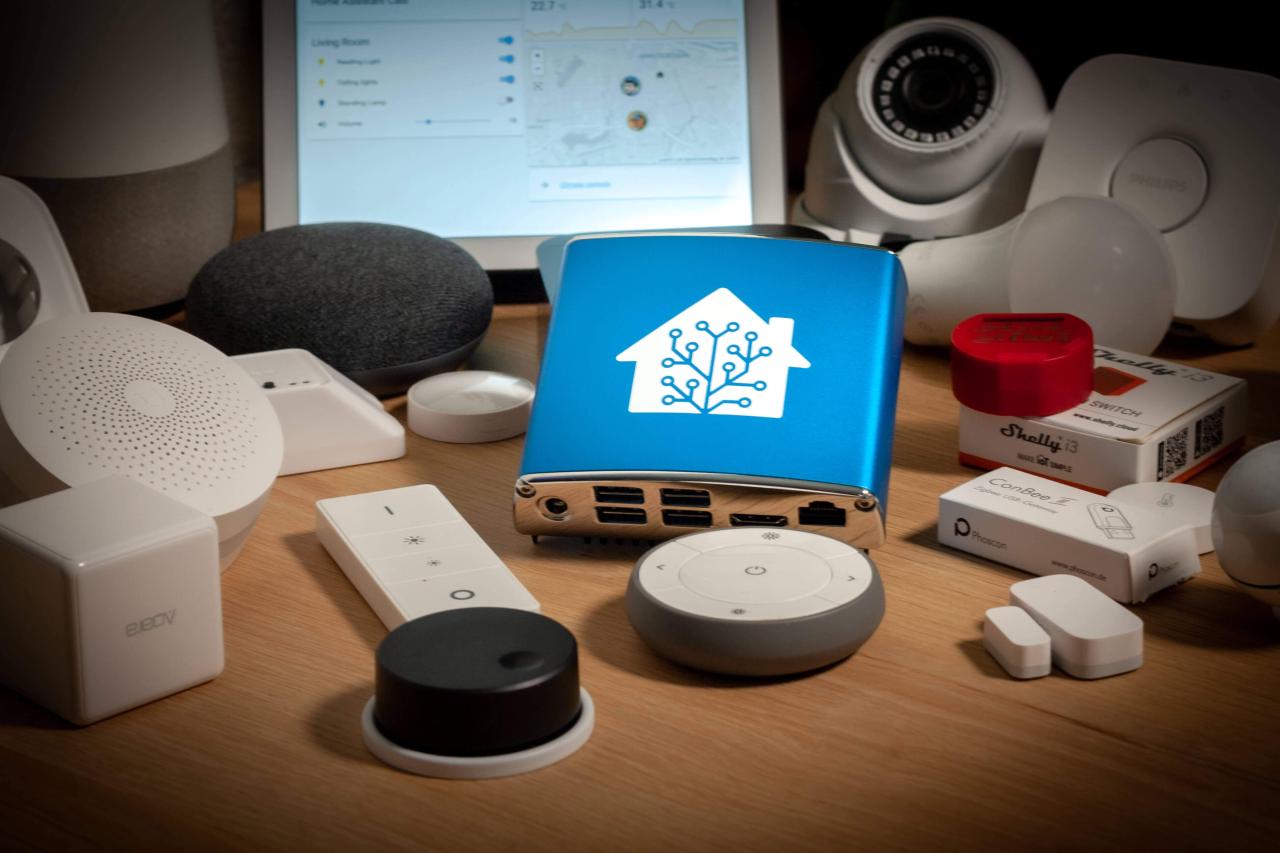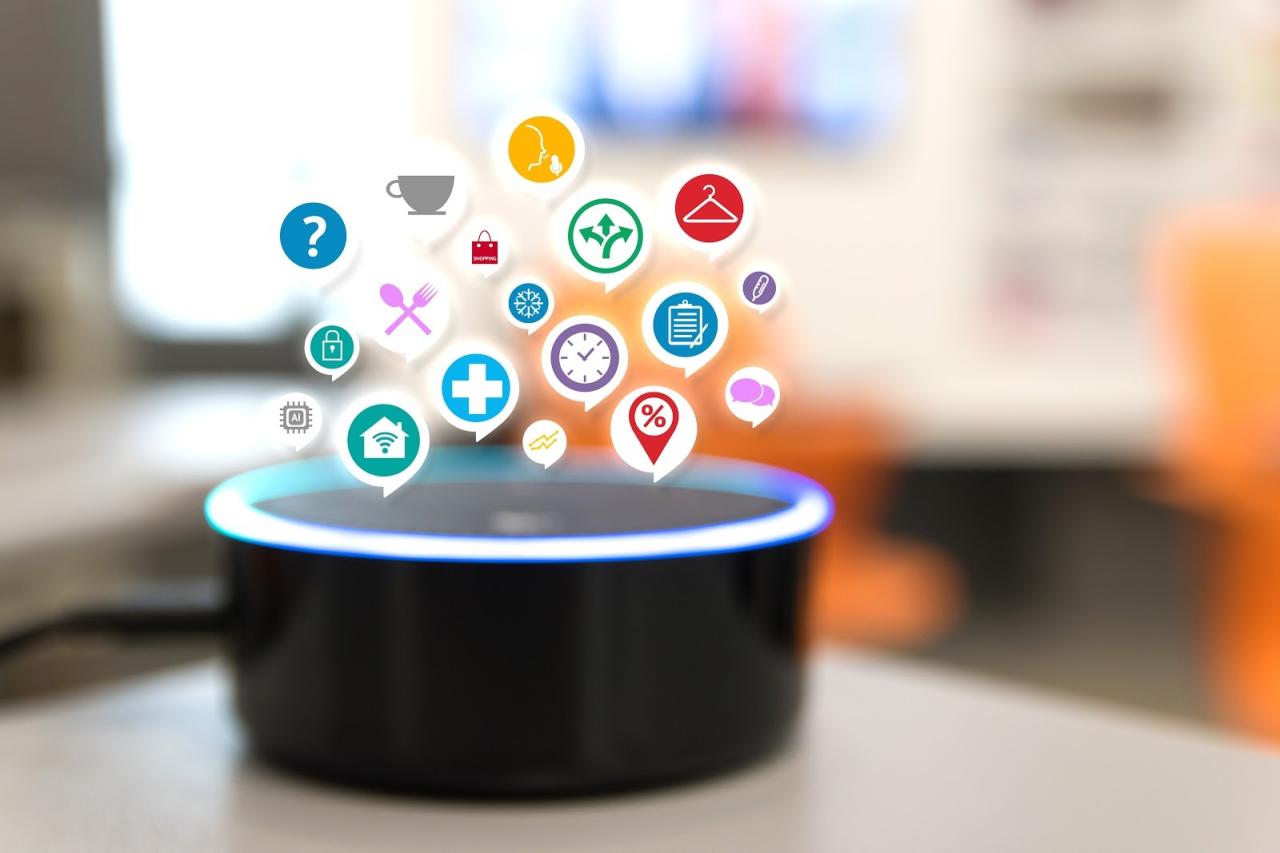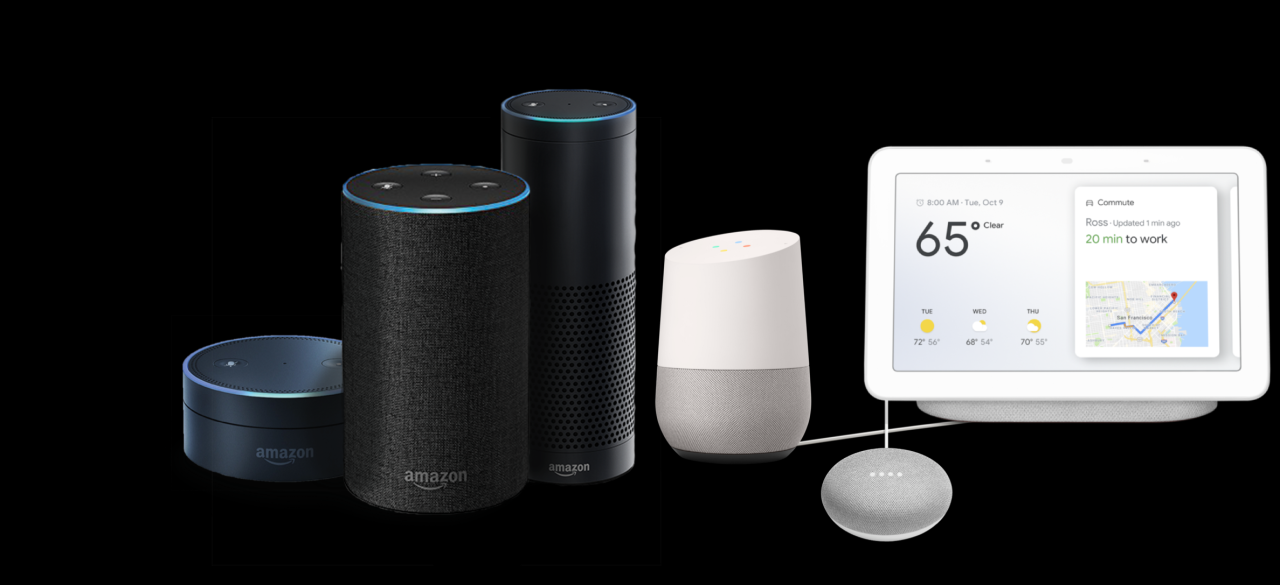Smart Home Voice Assistant Devices

Smart Home Voice Assistant Devices sets the stage for this enthralling narrative, offering readers a glimpse into a story that is rich in detail and brimming with originality from the outset. As technology continues to evolve, these devices provide convenience, efficiency, and a touch of futuristic living to everyday routines. Let’s delve deeper into the world of smart home voice assistants and discover the endless possibilities they bring to our homes.
Introduction to Smart Home Voice Assistant Devices
Smart home voice assistant devices are innovative gadgets that use artificial intelligence to interact with users through voice commands. These devices can perform various tasks like playing music, setting reminders, controlling smart home devices, providing weather updates, and answering questions, all through simple voice commands.
Benefits of Using Smart Home Voice Assistant Devices
- Convenience: Voice assistants make it easy to control smart home devices without the need to physically interact with them.
- Efficiency: These devices can streamline daily tasks and save time by automating routines.
- Accessibility: Voice assistants are user-friendly and accessible to all, including individuals with disabilities.
- Entertainment: Users can enjoy music, podcasts, audiobooks, and more by simply using voice commands.
Popular Smart Home Voice Assistant Devices
- Amazon Alexa: Alexa is a widely used voice assistant developed by Amazon, compatible with a variety of smart home devices.
- Google Assistant: Google Assistant is another popular voice assistant that offers seamless integration with Google services and smart devices.
- Apple Siri: Siri is the voice assistant for Apple devices, providing personalized assistance and control over home accessories.
- Microsoft Cortana: Cortana is Microsoft’s voice assistant designed to help users with tasks and provide information through voice commands.
Features and Functionality

Smart home voice assistant devices offer a wide range of features and functionalities that make our lives easier and more convenient. These devices are equipped with advanced technology that allows users to interact with them using voice commands, making tasks hands-free and effortless.
Key Features:
- Voice Control: Users can control smart home devices such as lights, thermostats, and security cameras with simple voice commands.
- Information Retrieval: Users can ask for weather updates, news, traffic reports, and general information just by asking the device.
- Task Management: These devices can set reminders, create to-do lists, and manage schedules to help users stay organized.
- Entertainment: Users can play music, podcasts, audiobooks, and even control their smart TVs through voice commands.
- Smart Home Integration: Voice assistants can connect and control various smart home devices from different brands, providing a seamless smart home experience.
Tasks these devices can perform:
- Controlling Smart Home Devices: Adjusting lighting, temperature, and security settings with voice commands.
- Setting Reminders and Alarms: Creating reminders for important tasks or setting alarms to wake up in the morning.
- Answering Questions: Providing quick answers to general knowledge questions, calculations, and definitions.
- Playing Music and Entertainment: Streaming music, podcasts, and radio stations on demand.
- Shopping and Ordering: Users can add items to their shopping list or place orders for products through online retailers.
Voice recognition technology plays a crucial role in enabling interaction with smart home voice assistant devices. This technology allows the devices to understand and interpret human speech, converting it into actionable commands. Advanced algorithms and machine learning techniques are used to improve the accuracy and responsiveness of voice recognition, making the user experience more seamless and intuitive.
Integration with Smart Home Ecosystem

Smart home voice assistant devices play a crucial role in integrating various smart home devices to create a seamless and interconnected ecosystem within your home. These devices act as the central hub, allowing you to control and manage all your smart devices with simple voice commands.
Compatibility with Different Smart Home Ecosystems
Smart home voice assistant devices are designed to work with a wide range of smart home ecosystems, ensuring compatibility with popular platforms like Amazon Alexa, Google Assistant, Apple HomeKit, and more. For example, Amazon Alexa has built-in support for Zigbee, a popular wireless protocol used in smart home devices, enabling seamless integration with Zigbee-compatible devices for a more comprehensive smart home experience.
Enhancing the Overall Smart Home Experience
By integrating with smart home ecosystems, voice assistant devices offer a range of features and functionalities that enhance the overall smart home experience. For instance, you can use voice commands to control lighting, adjust thermostats, lock doors, play music, set reminders, and even receive updates on weather and traffic conditions. This level of automation and convenience not only makes daily tasks easier but also adds a layer of sophistication and efficiency to your smart home setup.
Privacy and Security Concerns

When it comes to smart home voice assistant devices, users often have concerns about their privacy and security. These devices are constantly listening for their wake word, which raises questions about who might be listening and what data is being collected.
Privacy Concerns
- One common privacy concern is the potential for voice recordings to be stored and used for targeted advertising or other purposes without the user’s consent.
- There is also the risk of unauthorized access to the device, leading to the exposure of sensitive information or even surveillance.
- Users may worry about their conversations being recorded and stored, even if unintentionally, leading to privacy breaches.
Security Concerns
- Security vulnerabilities in smart home voice assistant devices could lead to hackers gaining access to the device and potentially controlling other connected smart home devices.
- Users may also be at risk of phishing attacks or malware infections through voice assistant interactions.
- Data breaches could expose personal information, such as passwords or credit card details, stored or transmitted by the device.
Protecting Privacy
- Users can protect their privacy by reviewing and adjusting the device’s settings to limit data collection and voice recordings.
- Regularly updating the device’s software can help patch security vulnerabilities and protect against potential threats.
- Being mindful of what information is shared with the voice assistant and avoiding sensitive conversations near the device can also enhance privacy.
Comparison of Privacy Policies
- It is essential for users to review the privacy policies of different voice assistant device manufacturers to understand how their data is collected, stored, and used.
- Comparing policies can help users make informed decisions about which devices align with their privacy preferences and concerns.
- Some manufacturers may offer more transparent policies or greater control over data sharing, giving users more peace of mind about their privacy.
Future Trends and Innovations
Smart home voice assistant devices have come a long way in revolutionizing the way we interact with our homes. Looking ahead, there are several exciting trends and innovations on the horizon that could further enhance the capabilities of these devices and reshape the future of smart living.
Enhanced Personalization
One of the key trends in the future of smart home voice assistant devices is enhanced personalization. With advancements in AI and machine learning, these devices will be able to better understand and adapt to individual preferences and habits. This means that users can expect a more tailored and intuitive experience, with voice assistants anticipating their needs and providing more personalized recommendations.
Integration with IoT Devices
Another exciting innovation to look out for is the seamless integration of smart home voice assistants with a wide range of IoT devices. As the Internet of Things continues to expand, voice assistants will play a central role in connecting and controlling various smart devices in the home. This will lead to increased convenience and efficiency, allowing users to easily manage and automate different aspects of their home environment through voice commands.
Advancements in Natural Language Processing
Advancements in natural language processing (NLP) technology are also expected to drive significant innovations in smart home voice assistants. Future devices will be able to carry out more complex tasks and engage in more natural and context-aware conversations with users. This will enhance the overall user experience and make interactions with voice assistants even more seamless and intuitive.
Emotional Intelligence and Context Awareness
One intriguing development to watch for is the integration of emotional intelligence and context awareness into smart home voice assistants. By analyzing vocal cues and other contextual information, these devices may be able to detect and respond to users’ emotions, providing more empathetic and personalized interactions. This could open up new possibilities for emotional support, mental health monitoring, and overall well-being through voice technology.
FAQ Explained: Smart Home Voice Assistant Devices
How secure are smart home voice assistant devices?
Smart home voice assistant devices prioritize security measures such as encryption and user authentication to safeguard user data and privacy.
Can smart home voice assistants work with other smart home devices?
Yes, these devices are designed to integrate seamlessly with a wide range of smart home devices, allowing for centralized control and automation.
Do smart home voice assistants have language limitations?
Most voice assistant devices support multiple languages, enabling users from different regions to interact with them effectively.
How do smart home voice assistants handle multiple users?
Smart home voice assistants can recognize different users’ voices and provide personalized responses and information based on individual preferences.